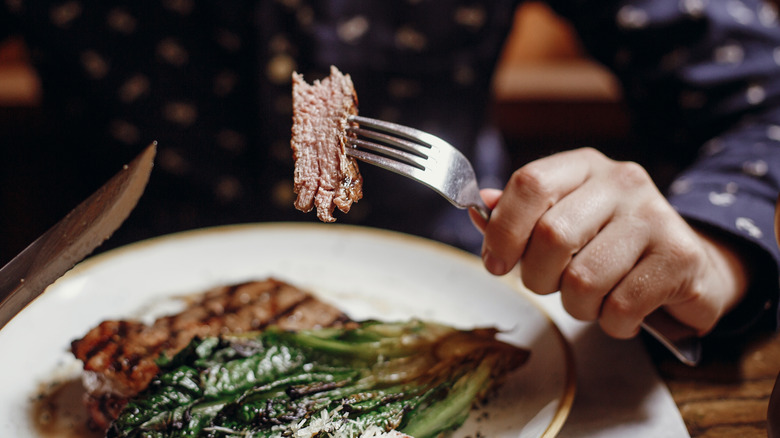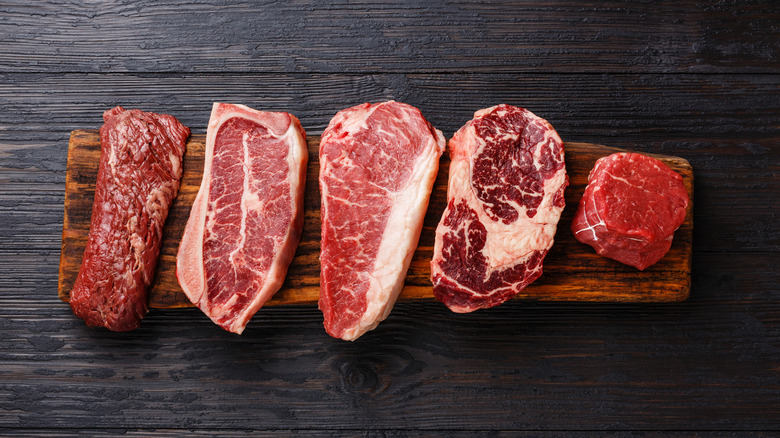What Happens To Your Poop When You Stop Eating Red Meat
Red meat consumption is quite a controversial topic in health circles. While some experts like registered dietitian Erin Coates (via Cleveland Clinic) believe that regular consumption of this type of meat can lead to inflammation, others, like Ken D. Barry, MD, don't (via YouTube); but it's safe to say that all of this back and forth has kept the interest in red meat ongoing.
However, if you regularly enjoy a steak for dinner or avidly consume veal, lamb, mutton, or pork, and have decided to cut down, you may start noticing some changes in your poop habits. For starters, red meat is one of those foods that can cause constipation, or at the very least, make existing constipation woes worse. Stopping consumption of this protein might mean more frequent and more pleasant bowel movements.
How avoiding red meat might cure your constipation
Fiber makes you poop. It's what pulls water into your stools to give them that soft and bulky texture and it also allows for easier passage of waste through and out of your system. Red meat does not contain fiber. Stopping red meat consumption might (hopefully) mean you're adding fiber-rich sources of protein to your diet instead. This could result in regular bowel movements. Additionally, red meat contains iron, another culprit when it comes to constipation. And there's another reason why stopping red meat could relieve constipation too: its fat content.
Red meat is on the list of types of meat that contain the most amount of saturated fat. And high-fat diets have been linked with functional constipation as well. Regular consumption of saturated fatty acids, in particular, can lead to slower gastrointestinal transit and therefore constipation, per a 2021 study published in the journal Nutrients.
It is important to note here, however, that the consumption of red meat only becomes a problem bowel health-wise, if you're not balancing your meal out with sufficient fiber and other nutrients. Having a steak and still managing to consume your whole grains and plant foods means you're eating a balanced meal.
Plus, stopping red meat consumption doesn't automatically mean that you're going to increase your fiber intake. If you're replacing red meat with other sources of meat — like poultry, fish, and seafood— you're still going to be left with no fiber content. That being said, there is also such a thing as a red meat allergy or red meat intolerance which can have an effect on your poop as well.
Why avoiding red meat might also help with diarrhea
An allergic reaction (immune system response) to meat and an intolerance to red meat (a digestive problem) can both result in diarrhea.
Although not classified as one of the top allergens, red meat can cause allergic reactions in some people. Other symptoms of an allergic reaction include hives, itching, nausea, vomiting, heartburn, indigestion, stomach pain, difficulty swallowing, swollen mouth, throat, tongue, and eyelids, dizziness, low blood pressure, shortness of breath, and even trouble breathing. An allergy test would be able to help tell you if you're one of those few people whose immune systems react negatively to consuming red meat.
According to a gastroenterologist and associate professor of medicine at Harvard Medical School, Dr. Jacqueline Wolf (via Livestrong), having an intolerance to red meat is about not being able to properly digest all the components — such as the fat — found in red meat. Having greasy stool, also known as steatorrhea, can mean that you should stop or limit your consumption of high-fat meats like red meat. It's also a good idea to speak with your doctor since having greasy stool can be a sign of conditions like liver, gallbladder, or pancreatic disorders.
At the end of the day, what happens to your gut health, including how often you should really be pooping, is a good indicator of your overall health and what kind of nutrition you're getting. Paying attention to it is always a good idea.



